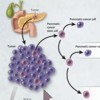Pharmacogenomics Update in Pancreatic Cancer
Abstract
Pancreatic cancer is the fourth leading cause of cancer-related deaths in United States. Despite advances in understanding cancer biology and therapeutics, this malignancy carries a grave prognosis with a poor overall survival rate. This is especially true for patients with locally advanced and metastatic disease that are not amenable to surgical resection. Given advances in human genome sequencing and pharmacogenomics, we now better understand the complex genetic makeup of these tumors and numerous gene mutations have been identified that could be potential targets for drug development. In this review, we discuss two abstract (Abstracts #208 and #192) presented at the 2014 ASCO Gastrointestinal Cancers Symposium about pancreatic cancer genome sequencing and their implications for the future of this disease. We discuss what is known about the genome of pancreatic tumors, including common mutations like KRAS, TP53 and SMAD4, as well as discovery of additional mutations. In particular, KRAS2 mutations in a subset of patients with pancreatic cancer are discussed. While limited in size and clinical correlativity, these abstracts provide at least seven novel/targetable mutations and elucidate biologic differences in tumors with wild type and mutant KRAS. These are important steps in understanding tumor biology and genetic basis of pancreatic cancer to help develop targeted drug therapies in the fast approaching era of personalized medicine.
Image: Hidalgo M. N Engl J Med 2010; 362:1605-7 (Detail of figure 1).
Downloads
References
Howlader N, Noone AM, Krapcho M, Garshell J, Neyman N, Altekruse SF, Kosary CL, Yu M, Ruhl J, Tatalovich Z, Cho H, Mariotto A, Lewis DR, Chen HS, Feuer EJ, Cronin KA (eds). SEER Cancer Statistics Review, 1975-2010. http://seer.cancer.gov/csr/1975_2010/
Mahalingam D, Kelly K, Giles FJ et al. Emerging drugs in the treatment of pancreatic cancer. Expert Opin Emerging Drugs (2009);14(2):311-328
Vogelstein B, Kinzler KW. Cancer genes and the pathways they control. Nat Med 2004;10:789-99
Jones S, Zhang X, Parsons DW, et al. Core signaling pathways in human pancreatic cancers revealed by global genomic analyses. Science 2008;321:1801-6
Buchholz M, Gress TM. Molecular changes in pancreatic cancer. Expert Rev Anticancer Ther 2009;9:1487-97.
Hidalgo M. Pancreatic cancer. New Engl J Med 2010;362:1605-07
Iacobuzio-Donahue 2011. Genetic evolution of pancreatic cancer: lessons learnt from the pancreatic cancer genome sequencing project. Gut 2012;G1:1085-94
Teague AS, Tan BR, Wang-Gilliam A et al. Next-generation sequencing in pancreatic cancer: Revealing genomic mutations beyond KRAS. J Clin Oncol 32, 2014 (suppl 3; abstr 208)
Salem ME, Al-hajeili MR, Karmanos BA et al. Clinicopathologic features of patients with KRAS wild-type pancreatic adenocarcinoma. J Clin Oncol 32, 2014 (suppl 3; abstr 192)

Copyright (c) 2014 Aditi Puri, Muhammad Wasif Saif

This work is licensed under a Creative Commons Attribution 4.0 International License.
As a member of Publisher International Linking Association, PILA, iMedPub Group’s JOP follows the Creative Commons Attribution License and Scholars Open Access publishing policies. Journal of the Pancreas is the Council Contributor Member of Council of Science Editors (CSE) and following the CSE slogan Education, Ethics, and Evidence for Editors.